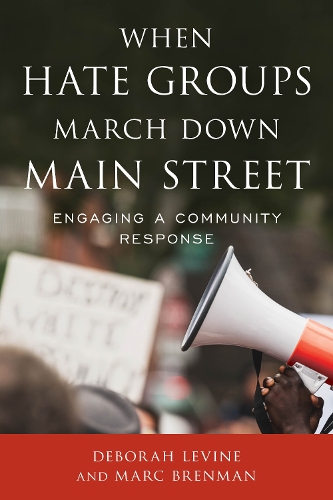
When Hate Groups March Down Main Street: Engaging a Community Response
(Paperback)
Publishing Details
When Hate Groups March Down Main Street: Engaging a Community Response
By (Author) Deborah Levine
By (author) Marc Brenman
Bloomsbury Publishing PLC
Rowman & Littlefield Publishers
30th October 2019
United States
Classifications
Professional and Scholarly
Non Fiction
Ethnic groups and multicultural studies
Crime and criminology
Violence and abuse in society
320.533
Physical Properties
Paperback
268
Width 154mm, Height 227mm, Spine 17mm
372g
Description
When Hate Groups March Down Main Street is a comprehensive, authoritative resource guide for communities, organizations, and individuals who are concerned and intimidated by the resurgence of neo-Nazi and extreme right-wing groups in the United States. Communities have often been caught flat-footed when confronting neo-Nazi and far right-wing extremists. This book examines how hate groups act and what motivates them and discusses, using case studies and community resources, how to equip communities to successfully respond to these incursions.
Reviews
The persistent problem of hate crimes by white supremacist groups appears to be getting worse, not better. This should be a cause of concern for all law abiding citizens and people of goodwill. Thats why a new book extensively examining the issue is a must read: When Hate Groups March Down Main Street: Engaging a Community Response (Rowman & Littlefield). Co-authors Deborah J. Levine and Marc Brenman present a disturbingly vivid account of the historical evolution of hate groups and their radical racist ideology. The book includes key statistics, case studies, legal and anecdotal evidence, as well as practical leadership lessons for a new generation of young people and people of all ages. This is a critically important book at a critically important time. The authors also provide smart citizen engagement strategies for communities to embrace. * American Diversity Report *
When Hate Groups March Down Main Street offers much-needed answers to a critical question: What can communities do in response to an incident of hate that occurs in the neighborhood Deborah Levine and Marc Brenman do more than offer a summary of current practices or case studies that instruct and inform; they provide a historical context as to what actions are most effective and why. This book should be on the desks of public officials, community groups, houses of worship, schools, and ordinary citizens who care about protecting the freedoms of fellow humans. -- Carolyn Turpin-Petrosino, Bridgewater State College
The authors provide an excellent balance of historical context, current events, and associated terminology to paint a picture of how hate manifests into heinous actions which hurt our communities. This overview is paired with straightforward, actionable strategies individuals and teams can use to combat the spread of hate on individual, organizational, and community levels. The book is written in clear and succinct language, which is appropriate for readability by diverse audiences. -- Deborah Levin
The authors provide a compelling and comprehensive look at the disturbing rise of hate groups and related issues, including actionable recommendations to address the alarming surge of hate crime. The book provides an historical overview of the origins, ideology and evolution of hate groups, buttressed by key statistics, case studies, legal and anecdotal evidence from past to present. This is an informative, illuminating and educational training tool on a critically important topic, at a critically important time. The book contains practical lessons and leadership examples not only for a new generation of young people, but for people of every generation. Ask yourself what you and your family would do if hate groups marched down your street The reality is unnerving because the threat is real, as the authors astutely articulate in meticulous detail. -- David B. Grinberg, Former national media spokesman and federal program analyst for the U.S. Equal Employment Opportunity Commission (EEOC) headquarters in Washington, D.C.
This book can help our communities address the growing threat of hate and violence. Deborah Levine and Marc Brenman have provided a guidebook of in depth information for civic leaders, educators and residents in schools and communities everywhere who want to make their towns safe for everyone. -- Patrice O'Neill, founder/director, Not In Our Town
Author Bio
Deborah Levine is the Editor in -Chief of the AmericanDiversityReport.com and editor of Religious Diversity at Work. She has been published in the Huffington Post, Harvard Divinity School Bulletin, and Christian Century and is an opinion columnist with the Chattanooga Times Free Press. She is a keynote speaker at universities, service organizations, national conferences, and professional associations, as well as a coach and diversity trainer/speaker for numerous organizations. She is the founder of the DuPage /Chicago Interfaith Resource Network and Southeast Womens Council on Diversity and former executive of Jewish Federations and the American Jewish Committee/Chicago.
Marc Brenman is the former executive director of the Washington State Human Rights Commission and has served with the Office for Civil Rights of the United States Department of Education. He was Senior Policy Advisor for Civil Rights at the US Department of Transportation. He was a committee member for the Health Equity and Civil Rights Project and The City Project; regional advisor, School of the South; and a member of the Diversity Standards Task Force for the Society for Human Resources Management, in addition to being a member of the Environmental Justice and Equity Committees of the Transportation Research Board. He is coauthor (with Tom Sanchez) of The Right to Transportation and Planning as if People Matter: Governing for Social Equity.
